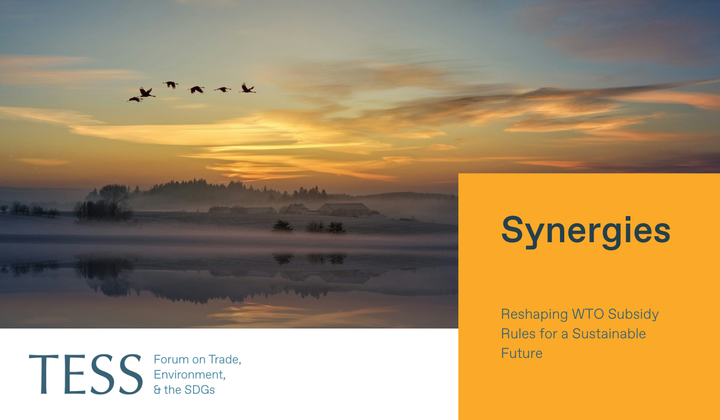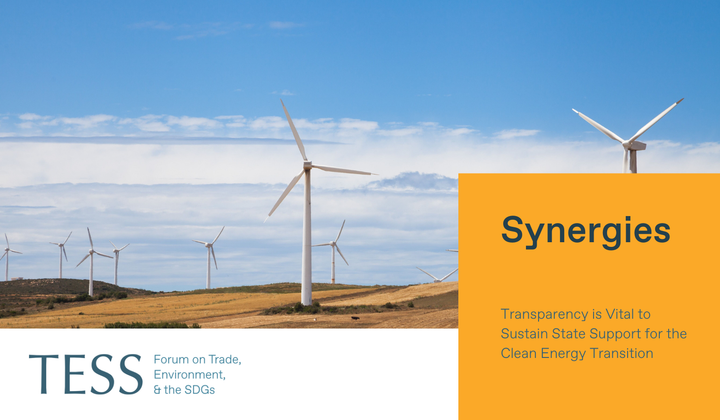Many countries are introducing new forms of subsidies support, rather than removing existing policy disincentives for globally sustainable outcomes and markets. Moreover, WTO members continue to embrace their well-worn talking points, with little apparent appetite for modernizing multilateral subsidy rules. There is an urgent need for them to embrace the reform nettle, starting with generating a robust analytical base in partnership with other international organizations.
This article is part of a Synergies series on reviving multilateralism curated by TESS titled From Vision to Action on Trade and Sustainability at the WTO. Any views and opinions expressed are those of the author(s) and do not necessarily reflect those of TESS or any of its partner organizations or funders.
-----
There is a vast literature demonstrating the high economic and trade costs, and the limited benefits, of many government support measures across commodity and industrial sectors. There is also growing evidence of these policies’ huge environmental and climate costs, and a strong economic and environmental case for public support to accelerate the transition to a low carbon circular economy.
But policy design matters. To be effective, support provided must be transparent, targeted to explicit beneficiaries, proportionate to achieving the desired outcome, time-limited, and non-discriminatory. To ensure that support works as intended, it is essential that attention focus on the actual impacts of support policies as they are implemented. Explicit policy objectives only describe what governments want to achieve; the actual impacts of support, domestically and internationally, can be very different.
Subsidies, the Green Transition, and International Organizations
Absent a consensus amongst WTO members to reform subsidy rules, relevant international organizations should be requested to work together to distinguish much more clearly between good subsidies and bad subsidies.
Absent a consensus amongst World Trade Organization (WTO) members to reform subsidy rules, relevant international organizations should be requested to work together—urgently—to distinguish much more clearly between good subsidies and bad subsidies. Valuable data and analytical work have already been undertaken by the Organisation for Economic Co-operation and Development (OECD) and the WTO and, along with the International Monetary Fund (IMF) and the World Bank Group (WBG), they have committed to further individual and joint efforts addressing subsidies and related policies. But more needs to happen, more quickly. The four international organizations, along with relevant others, should step up their efforts to define the characteristics of good subsidies (i.e. those most likely to achieve their aims at reasonable cost and without unintended negative impacts) in contrast to bad subsidies (i.e. those least likely to perform as intended).
Early action can be taken based on what is already known about existing subsidies and related regulatory policies. Many are unlikely to achieve their stated aims, are production and trade distorting, can damage the environment and increase greenhouse gas (GHG) emissions, are costly, and can crowd-out investment in other public priorities. Once this analytical work is complete, the WTO’s existing subsidies categorizations, represented in the Agreement on Subsidies and Countervailing Measures (SCM Agreement) can be comprehensively updated and modernized, particularly Parts II and III that deal with prohibited and actionable subsidies.
What Analytical Work is Required, and By Whom?
International organizations should take a comprehensive approach to analysis of government support, looking across fossil fuels, agriculture, fisheries, industrials, and advanced technologies. Three examples illustrate this point.
From a climate perspective, the continued existence of fossil fuel subsidies is particularly egregious. In 2022, 45 countries, all G20 or OECD members, provided support to producers and consumers of fossil fuels totalling around 1$.3 trillion; for the decade prior, support ranged from just under $400 billion to $800 billion annually. Phasing out these subsidies would provide immediate environmental and climate benefits and make significant funding available for other public policy priorities, from education and health to a clean energy economy.
Agriculture, forestry, and other land use change are responsible for around 30% of global GHG emissions. Support to the sector currently averages more than $851 billion per year, fully $456 billion of which is directly tied to farm input use and output quantities, which are amongst the potentially most trade distorting and environmentally harmful forms of support available. Phasing out production-linked support in favour of new policy approaches that encourage efficient resource use, address climate change, boost innovation, increase productivity, and enhance livelihood opportunities would improve climate, environment, and economic outcomes. Increased public and private investments in digital tools and data analytics would be particularly beneficial across the food supply system, including most importantly on farms.
The aluminium sector has attracted global attention in a context of concern about the growing role of state enterprises in international markets, but there has been less consideration of associated environmental impacts. Pervasive state support across aluminium supply chains has primarily encouraged extraction, production, processing, and export in high GHG emitting production systems, and contributed directly to a much higher than otherwise carbon footprint across the sector globally. High levels of government support also discourage investment and innovation by unsubsidized firms unable to compete with the deep pockets of the state. This is particularly important as demand for aluminium as a critical material for the energy transition is expected to grow 80% by 2050.
In stepping up their efforts to support subsidy reform, international organizations should collaborate actively with the private sector, the academic community, and other stakeholders to ensure the widest possible availability of robust data and objective analysis to inform public policy choices.
In stepping up their efforts to support subsidy reform across these and other areas, international organizations should collaborate actively with the private sector, the academic community, and other stakeholders to ensure the widest possible availability of robust data and objective analysis to inform public policy choices. This is essential, both ex ante and ex post, as poor policy design carries an enormous risk of creating wasteful and offsetting subsidies, divergent regulatory frameworks, and fragmented regional and global markets—all while failing to achieve the stated policy goals.
The Case for Reforming “Bad Subsidies”
We do not suggest that government support for globally sustainable outcomes and markets needs to “go to zero”. We do advocate that demonstrably bad subsidies that distort production, investment, and trade decisions, discriminate across potential beneficiaries, or harm the environment be removed in favour of good subsidies and other forms of government support that address market failures and promote competition and innovation.
The rationale is simple. First, the opportunity costs of ineffective subsidies are enormous for all countries—developed, emerging, and developing. No countries can afford to financially support the few and forego investments in essential public services for the many. Second, subsidy competition amongst countries increases uncertainty for businesses needing to invest in their own contributions to more sustainable outcomes. Governments should instead be looking at ways to establish the enabling environment in which businesses can be confident in spending the trillions required to build a circular and clean energy economy.
It is very easy to write about removing bad subsidies, but it is much harder to remove them. There are major consequences for the individuals, families, and firms that currently benefit from subsidies, trade protection, and the resulting industry structure. Not all will be able to make the transition to a new living and working environment on their own. Socially responsible subsidy reform should happen progressively over time and be accompanied by adjustment assistance for those unable to make the transition on their own.
The WTO’s Central Role
Societal acceptance of eliminating subsidies at home would also be greatly facilitated if undertaken in the context of multilateral cooperation—at the WTO—where all countries agree to avoid the temptation to increase global market share based on discriminatory subsidies and regulations. The benefits of subsidy reform would accrue both to the relatively few countries that account for most subsidies today and to the many more less-developed countries that simply do not have the fiscal capacity to join a subsidy race. As the custodian of the SCM Agreement, WTO members have a crucial role to play in securing meaningful reform commitments.
But until the first-best option of a multilateral commitment to eliminating bad subsidies is in hand, the IMF, OECD, WBG, WTO, and others should work together to articulate and promote objective and evidence-based policies, including good subsidies and other forms of government support, that would enable globally sustainable outcomes and markets.
-----
Ken Ash is Director, Ash Global Insights, Visiting Fellow at the Institute for International Trade, Adelaide, and former OECD Director of Trade and Agriculture.
Anthony Cox is Senior Policy Advisor with the Ecologic Institute, and former OECD Deputy Director of the Environment Directorate.
Peter Draper is Executive Director, Institute for International Trade and Director of the Jean Monnet Centre of Excellence in Trade and Environment at the University of Adelaide.
-----
Synergies by TESS is a blog dedicated to promoting inclusive policy dialogue at the intersection of trade, environment, and sustainable development, drawing on perspectives from a range of experts from around the globe. The editor is Fabrice Lehmann.
Disclaimer
Any views and opinions expressed on Synergies are those of the author(s) and do not necessarily reflect those of TESS or any of its partner organizations or funders.
License
All of the content on Synergies is licensed under a Creative Commons Attribution-NonCommercial-ShareAlike 4.0 International (CC BY-NC-SA 4.0)
license. This means you are welcome to adapt, copy, and share it on your platforms with attribution to the source and author(s), but not for commercial purposes. You must also share it under the same CC BY-NC-SA 4.0 license.
If you would like to reuse any material published here or if you have any other question related to Synergies, send an email to fabrice.lehmann@graduateinstitute.ch.






